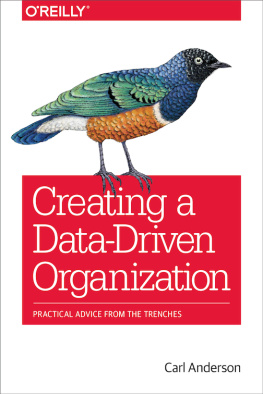The Data
Toolkit
To Dan, Jake, Grace, and Truman:
Thank you for showing me in a thousand
ways that relationships matter.
Rob
To Ray, my husband; my mom, Muriel; and my dad, David:
Thank you for your love and support, and the way in which you always modeled
putting students first in your own work in schools. You have touched the lives of many!
Pam
The Data
Toolkit
Ten Tools for Supporting School Improvement
Robert T. Hess
Pam Robbins
Foreword by Kate Dickson
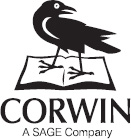

FOR INFORMATION:
Corwin
A SAGE Company
2455 Teller Road
Thousand Oaks, California 91320
(800) 233-9936
Fax: (800) 417-2466
www.corwin.com
SAGE Ltd.
1 Olivers Yard
55 City Road
London EC1Y 1SP
United Kingdom
SAGE India Pvt. Ltd.
B 1/I 1 Mohan Cooperative Industrial Area
Mathura Road, New Delhi 110 044
India
SAGE Asia-Pacific Pte. Ltd.
33 Pekin Street #02-01
Far East Square
Singapore 048763
Acquisitions Editor: Debra Stollenwerk
Associate Editor: Desire A. Bartlett
Editorial Assistant: Kimberly Greenberg
Project Editor: Veronica Stapleton
Copy Editor: Michelle Ponce
Typesetter: C&M Digitals (P) Ltd.
Proofreader: Dennis W. Webb
Indexer: Sheila Bodell
Cover Designer: Scott Van Atta
Permissions Editor: Adele Hutchinson
Copyright 2012 by Corwin
All rights reserved. When forms and sample documents are included, their use is authorized only by educators, local school sites, and/or noncommercial or nonprofit entities that have purchased the book. Except for that usage, no part of this book may be reproduced or utilized in any form or by any means, electronic or mechanical, including photocopying, recording, or by any information storage and retrieval system, without permission in writing from the publisher.
All trade names and trademarks recited, referenced, or reflected herein are the property of their respective owners who retain all rights thereto.
Printed in the United States of America
Library of Congress Cataloging-in-Publication Data
Hess, Robert T. (Robert Thomas), 1962
The Data toolkit : ten tools for supporting school improvement / Robert T. Hess, Pam Robbins; foreword by Kate Dickson.
p. cm.
Includes bibliographical references and index.
ISBN 978-1-4129-9297-8 (pbk.)
1. School management and organizationData processing.
2. School management and organizationDecision making.
3. School improvement programs. I. Robbins, Pam. II. Title.
LB2806.17.H47 2012
371.2dc23 2011040855
This book is printed on acid-free paper.
11 12 13 14 15 10 9 8 7 6 5 4 3 2 1
Contents
Foreword
Kate Dickson
Foreword
A Toolkit for Moving Forward
A s we find ourselves striving to ensure that every child is prepared to pursue the challenges and opportunities of the 21st Century, we must focus on the quality of teaching and learning in every school and classroom. The authors of this book have taken a significant step as they provide a toolkit to help us more effectively educate all students in the 21st Century.
The Data Toolkit provides practical insights and practical strategies to facilitate effective teaching and learning. It supports educators in analyzing data in a way that will empower higher-quality decision making related to curriculum, instruction, and assessment. Ultimately, if implemented well, this process will result in high student achievement and greater staff collaboration.
Most important, this book is not a typical set of formulas designed to aggregate, disaggregate, and manipulate data to identify highly successful schools or schools that are struggling. In contrast, it elegantly reflects Margaret Wheatleys theory of high-performing systems. It is the complex and continuous interaction between vision and purpose, data and information, and relationships that creates the synergy to generate high-performing systems. As Wheatley so thoughtfully suggests: ultimately, it is all about relationships.
This unique resource provides a fresh and holistic view of what it takes to support all educational stakeholders in creating high-performing schools and school communities. It places adults and children in context as a community that must work cooperatively to ensure the success of all. The blending of the high-touch and high-tech approaches is exactly what we need to achieve success for all schools and children.
This book is a major contribution to the field of education as it defines the essential work that education stakeholders need to engage in to realize our goals of educating all students in a world full of future possibilities and challenges. I trust that school board members, superintendents, principals, teachers, and parents will use it as they come together to create great schools.
As Albert Einstein so candidly said, The significant problems we have cannot be solved at the same level of thinking at which we created them.
This toolkit provides breakthrough ideas, direction, and possibilities for moving all of our schools forward.
Kate Dickson, PhD
President, Leadership Matters, Inc.
Chalkboard Project Advisor
Preface
W e have entered an age of accountability with increased demands for performance and decreased resources. There are concerns about preparing students with the right knowledge and skills for the 21st-century work-place and equipping them with the critical-thinking skills to face challenges that have yet to be defined. Together, these conditions place unprecedented pressure on schools to do more with less. The need to analyze student performance data, scrutinize which practices produce promising results, and identify interventions that must be implemented when desirable results are absent has never been greater. Together, these demands inspired the development of The Data Toolkit.
The Data Toolkit was designed with two purposes in mind:
- To provide classroom teachers and other school leaders, schools, and districts with practical quantitative and qualitative instruments to analyze data in a meaningful way and contribute to changes in practice that ultimately enhance staff and student learning
- To highlight a wide array of specific tools that can be used to examine a variety of data. Embedded in the use of each of these tools is a process that both builds community and focuses on results
The emphasis of each tool is not just on examining, charting, or graphing data but rather propelling individuals and teams to action with a plan informed by data and focused on results.
WHY THIS BOOK?
Most schools are swamped with data, and staff members often feel overwhelmed and immobilized by them. Many times they are unable to find meaning and derive next steps from their data. Douglas B. Reeves (2010), in a Leadership and Learning Blog referred to these conditions with the phrase Drowning in Data; Thirsty for Information. Even when educators know a problem exists, they often dont have a process that delineates what to do next. This may result in a lack of improvement or action, but it is not for lack of caring or trying.
Data paralysis, as opposed to data analysis, often occurs because teams do not have a structure to help them reflect upon data and ask meaningful questions about the data in order to clarify and identify the problem that needs to be solved. Once the problem is understood fully, then action planning can occur. Teachers, administrators, and support staff need specific tools to generate meaningful data, illuminate relationships between instructional interventions and student performance data, and facilitate conversations so that appropriate and responsive interventions can be designed, implemented, and carefully monitored, with the end result being high levels of student learning. In the process, teachers and administrators learn as well. Hence, the capacity to produce the desired results over time is created. That is where the data tools come in. Data tools help frame the questions, drive the conversation, and lead to reflectionthe most vital part of the data team process. Reflection is generated by the questions posed and pondered. Once understanding is uncovered, a data-driven plan with a focus on desired results can be crafted.
Next page

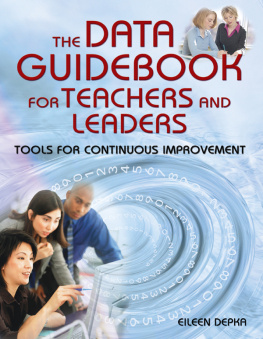



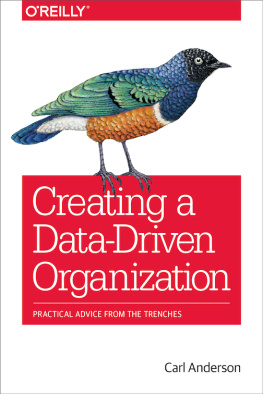
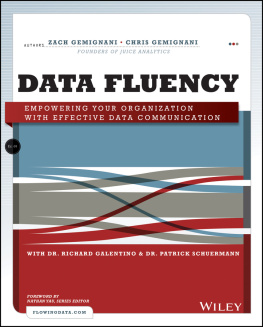

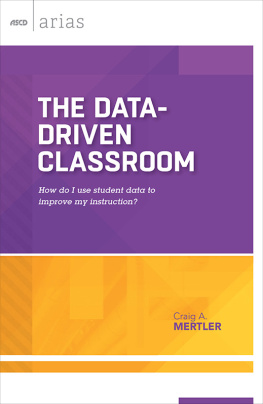
![Daniel D. Gutierrez [Daniel D. Gutierrez] - Machine Learning and Data Science: An Introduction to Statistical Learning Methods with R](/uploads/posts/book/119585/thumbs/daniel-d-gutierrez-daniel-d-gutierrez-machine.jpg)
